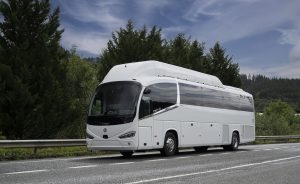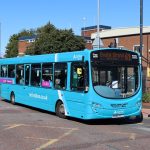The Irizar Group is recognised as an innovator. Established in 1889 it has continually, through its long history, challenged conventional design concepts in passenger transport.
In 2011 Irizar moved from its traditional body builder status to a manufacturer of complete vehicles, with the introduction of its Integral range of coaches, based on a DAF and ZF driveline.
The introduction of the Integral range has enabled Irizar to springboard into the development of future technologies. This started with the launch of the ie Bus and ie Tram, built at Aduna – Europe’s first purpose built manufacturing plant for 100% emission free buses.
Busworld 2023, held at Brussels Expo, 6th-12th October, has been the platform for the Irizar Group’s latest developments, focussing on Efficiency and sustainability.
The highlight of the exhibition stand was the Irizar Hydrogen i6S Efficient coach. Presented as a 12.9m long variant, this proof of concept FCEV (Fuel Cell Electric Vehicle) coach demontrates Irizar’s firm commitment to offering a complete range of zero-emissions vehicles for both long and short range.
This first FCEV hydrogen vehicle has been developed exclusively by Irizar, in conjunction with other leading companies and technology centres. It is currently in an extensive testing phase covering different types of operation and topography, enabling the accumulation of experience and knowledge – key to shaping future developments.
Testing has delivered a range of up to 1000 km and minimal charging times of around 20 minutes. The aim is to develop a coach to match the way our clients currently operate, meaning they can continue their existing routes and schedules with little or no disruption. In addition, it can run in 100% electric mode for short times, if required.
The future range of FCEV hydrogen vehicles, which currently includes the Irizar i6S Efficient and Irizar i4 models, will undergo substantial improvements over the first version that was presented at Busworld, some of the most important being increased luggage capacity, greater numbers of passengers, a longer range and lower weight.
The efficiency and high durability of the vehicle’s main components can also be highlighted. The batteries will stay with the vehicle for its entire useful life. And the fuel cell will need maintenance, without replacing components, after around 30,000 hours of operation, depending on the kind of routes and use.
With the presentation of this new coach, Irizar is at the forefront of technological development and on the pathway to sustainable, intelligent, connected, zero-emissions and multi-technology mobility.
Extensive testing continues and it is expected that orders will be able to be placed from the end of 2024 with the first examples in operation in 2025.
For operators wishing to explore this new technology further, please contact Julie Hartley, Sales Director, Irizar UK – Julie.hartley@irizar.co.uk, 07789 955866.
 What is a fuel cell electric vehicle or FCEV?
What is a fuel cell electric vehicle or FCEV?
An FCEV (fuel cell electric vehicle), is a fully electric vehicle that generates its own electricity supply to provide power to its motor. Instead of plugging the coach into an electricity supply to recharge a large battery pack, an FCEV uses hydrogen from on-board storage tanks to create electricity in a device called a fuel cell. Irizar’s proof-of-concept FCEV does also have the ability to plug-in to recharge its batteries if required and can drive a short distance on battery power alone.




















 What is a fuel cell electric vehicle or FCEV?
What is a fuel cell electric vehicle or FCEV?





